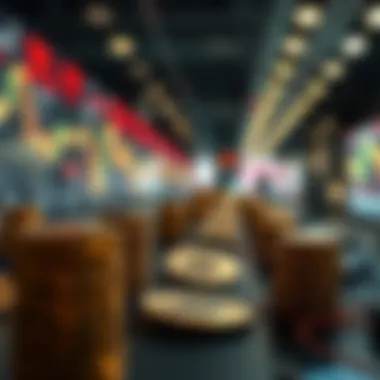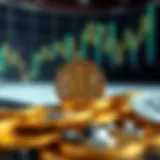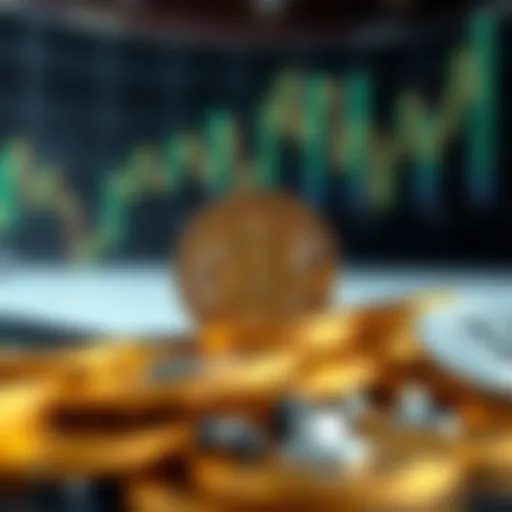Exploring Futures Trading Contests in Cryptocurrency


Intro
Futures trading contests have become a captivating feature in the rapidly changing world of cryptocurrencies. They operate at the crossroads of competitive strategy and market savvy, offering a dynamic platform for traders to not only test their skills but also sharpen them in real-time scenarios. While many might view these contests as simple competitions, they are, in fact, much more complex and strategic in their nature.
Unlike everyday trading, contests introduce a layer of adrenaline that provides insightful perspectives on traders’ behaviors and methodologies. Although the digital asset space is often marred by volatility and uncertainty, futures trading contests provide an opportunity to thrive amid chaos. By examining how traders navigate price swings, manage risk, and exploit market inefficiencies, individuals can gain a deeper understanding of the underlying principles that drive the crypto landscape.
In this article, we will explore the mechanics of futures trading contests, the essential terminology that newcomers must grasp, as well as effective strategies that seasoned traders utilize to emerge victorious. We aim to go beyond the basic frameworks, digging into the intricate specifics that define trading approaches, evaluate contest structures, and highlight the unique psychological dimensions of competitive trading.
This journey will not only equip both beginner traders and experienced investors with valuable tools but also clarify the benefits and hurdles that come with participating in these contests. Whether you are a keen investor looking to refine your strategy or an analyst keen on understanding market trends, you are in the right place to expand your knowledge of this exciting niche.
Prelims to Futures Trading Contests
Futures trading contests have carved a niche within the broader cryptocurrency landscape, marrying the thrill of competition with the analytical rigor of market strategies. In a space that can be fickle and flamboyant, these contests offer a structured playground where participants can hone their trading skills, test their strategies, and engage with a community of like-minded individuals. While the allure of high-stake returns might be the initial draw, it’s the rich learning environment that truly stands out.
Definition and Overview
Futures trading contests are competitive events where traders engage in buying and selling futures contracts within a set timeframe. Unlike standard trading, where the primary goal is often profit maximization, contests introduce a layer of rivalry—traders aim not just to be in the black, but to outperform their peers. Participants can range from novice traders testing the waters to seasoned professionals showcasing their expertise. Typically, these contests come with predefined rules regarding the duration, types of trades allowed, and overall competition structure. It’s essentially a test of skill, strategy, and sometimes, a pinch of luck.
Significance in the Crypto Market
In the realm of cryptocurrency, where volatility reigns supreme, futures trading contests hold significant value for several reasons:
- Skill Enhancement: These contests challenge traders to adapt, strategize, and learn from their mistakes in real-time, fostering an environment for rapid skill development.
- Market Insights: Traders gain practical insights into market trends and price movements, which can be invaluable for making informed decisions outside of the contest setting.
- Community Building: They create a hub for networking, allowing participants to connect, share insights, and possibly collaborate on future trading endeavors.
- Risk Management: Entering contests often forces traders to consider risk management strategies that they might otherwise overlook, adapting their approaches to minimize losses while maximizing gains.
Ultimately, futures trading contests are more than just competitions; they are fertile grounds for personal and professional growth in an ever-evolving market. By understanding the mechanics of these contests, traders and interested parties can glean insights that are applicable well beyond the contest realm.
Structure of Futures Trading Contests
Understanding the structure of futures trading contests is pivotal for anyone looking to navigate this competitive terrain. This section sheds light on the various types of contests and their settings, offering insights that can directly impact participant outcomes. Recognizing the differences aligns strategies with individual goals, enhances preparation, and allows participants to make informed decisions regarding their involvement.
Types of Contests
Open Contests
Open contests are designed to allow any participant to join. They don’t set hurdles like special invitations or closed communities, which makes them incredibly welcoming. This type is particularly advantageous for beginner traders wanting to test their mettle without any entry barriers.
- Key Characteristic: The primary allure of open contests is accessibility. Anyone with a registered account can take part, encouraging low-commitment trial runs for newcomers.
- Benefits: This approach fosters a diverse participant pool, resulting in a rich competitive environment. By inviting traders of varied skill levels, strategies can be tested against a broad spectrum of tactics.
- Unique Feature and Drawbacks: However, the broad base can mean higher volatility, leading to fluctuating results. The lack of participant selection can dilute the competitive edge that exists in other contest types, often favoring those able to adapt quickly to market shifts.
Invite-only Contests
Contrastingly, invite-only contests operate more like exclusive clubs, where only selected traders earn a spot. This alpha measure serves to elevate the level of competition and typically includes more seasoned traders.
- Key Characteristic: The exclusivity of certain skills or a proven track record can enhance the contest’s prestige.
- Benefits: Participants often find these contests yield deeper strategic battles, mostly due to the higher experience levels involved. This competitive maturity can lead to richer learning experiences for those involved.
- Unique Feature and Drawbacks: Yet, this exclusivity can also be a double-edged sword. For aspiring traders, the barrier to entry can appear daunting, limiting opportunities for growth and learning from more experienced peers.
Mini Contests
Mini contests represent a brief, often more casual approach to futures trading competitions. Their format can appeal to those looking for a shorter commitment while experimenting with strategies.
- Key Characteristic: Often lasting from a few hours to a day, the quick nature of these contests makes them less intimidating.
- Benefits: Mini contests allow traders to engage with real market scenarios without making long-term commitments. These instances can serve as a testing ground for specific strategies without overwhelming the participants.
- Unique Feature and Drawbacks: However, limited time can compel traders to make hurried decisions, potentially leading to rash trading behavior that would be avoided in longer contests.
Duration and Timing
Duration and timing are crucial elements that dictate the structure and accessibility of futures trading contests. Aligning the length of a contest with personal goals and market conditions is vital, as both factors can significantly influence trading strategies and outcomes.
Short-term vs Long-term
Short-term contests can foster quick decision-making and rapid adaptation. These are often more intense, pushing participants to react instantaneously to market fluctuations.
- Key Characteristic: The compressed timeline means that participants have to be on their toes, constantly observing the market.
- Benefits: This kind of pressure can enhance skills at reading quick market changes, which is a critical skill in crypto trading.
- Unique Feature and Drawbacks: Yet, the intense pace may also lead to emotional decision-making rather than strategic planning, which might not yield positive outcomes.
Long-term contests often run for weeks or even months, focusing on strategy rather than split-second reactions.
- Key Characteristic: These contests allow for broader strategy development and a more in-depth approach to market analysis.
- Benefits: Traders can refine strategies over time, adapting to market conditions rather than being forced to react quickly.
- Unique Feature and Drawbacks: However, this format can sometimes lead to complacency. Participants might overanalyze situations, missing out on opportunities or failing to react promptly to shifts in market dynamics.
Specific Schedule Formats
Specific schedule formats can dictate how contests are organized, from daily challenges to ongoing formats. Each presents different advantages and can greatly affect participant engagement.
- Key Characteristic: Scheduled formats provide clear guidelines and timelines, making them easier to fit into traders' existing schedules.
- Benefits: Participants can plan around specific times, allowing for better preparation. It also becomes easier to track progress and develop strategies accordingly.
- Unique Feature and Drawbacks: However, strict timelines may hinder those whose availability fluctuates, potentially locking out ambitious traders who could excel in a more flexible environment.


Understanding these various structures offers valuable insights for potential participants, allowing everyone from novices to seasoned traders to make informed decisions that align with their trading philosophy and goals.
Participation in Futures Trading Contests
Engaging in futures trading contests is a gateway for traders to hone their skills while competing against others in the fast-paced world of cryptocurrency. Participation is not just about showcasing one's trading prowess but also about leveraging the opportunity to learn from experiences and interactions with fellow traders. By delving into participation aspects such as eligibility, registration, and financial commitments, this article aims to shed light on what it truly takes to dive into this competitive arena.
Eligibility Requirements
Every contest has its own set of eligibility criteria that participants must meet. Generally speaking, these can range from age restrictions to geographical limitations. Some contests may require traders to hold an account with a specific exchange or trading platform.
For instance, if a trader wishes to join a competition hosted on Binance or BitMEX, they may need to have completed a set level of trading volume within a defined timeframe. This requirement is vital as it ensures that participants have a baseline of experience, ensuring a more level playing field and enhancing the overall quality of competition. Not meeting these criteria can lead to disqualification and wasted effort, making it essential for prospective contestants to understand the rules.
Registration Process
Registering for a futures trading contest could not be simpler, though it requires careful attention to detail. To join, interested participants must typically visit the platform hosting the contest and follow a series of prompts. Usually, this involves creating an account, providing necessary identification, and submitting any relevant documentation.
Once logged in, potential contestants need to find the contest section. It's often clearly highlighted. From there, they typically have to accept the contest rules, which may encompass aspects like trading minimums and prohibited strategies such as spoofing or wash trading. This step ultimately solidifies their commitment to the contest's integrity, ensuring fair play among traders. Timing is crucial, as registration windows can close just as quickly as they open, and being late might mean missing out on an opportunity.
Fees and Prizes
Entry Fees
Entry fees are a common feature in many futures trading contests. In general, they contribute to the prize pool and can vary significantly depending on the competition's scale and prestige. While some contests may have no entry costs, others might charge fees ranging from a modest amount to more substantial sums.
A key characteristic of entry fees is that they can enhance the contestant's commitment, as individuals are less likely to take the competition lightly when they've invested financially. This can transform the atmosphere of the contest into one that is highly competitive and intense, essential for fostering a serious trading environment. However, high entry fees may deter new entrants, limiting participation from novices who may have valuable insights but lack the financial backing.
Prize Structures
Prize structures can greatly influence a contestant's motivation. They often come in various forms, such as a distribution of the total entry fees collected, cryptocurrency awards, or trading credits for future use.
An attractive prize structure can draw attention and increase participation, making it a popular choice among contest organizers. Unique features of prize structures might include tiered rewards where the top traders receive larger percentages of the overall prize pool. This approach keeps the competition lively, as even those in lesser ranks still have the chance to earn rewards. However, a convoluted prize structure might leave potential participants confused, impacting the overall enthusiasm toward entering.
Understanding the dynamics of fees and prizes is crucial for traders looking to participate in futures trading contests. It shapes the competition landscape and influences the strategies they may consider.
Strategies for Success in Contests
In the high-stakes world of futures trading contests, crafting a sound strategy is as crucial as securing your entry ticket. Success hinges not just on your ability to analyze the market but also on how you adapt your tactics to the contest environment. This section dives deeper into strategies that can bolster a trader's edge when vying for top positions in these competitions. A well-rounded approach, encompassing technical analysis, risk management, and psychological readiness, can turn the tide in your favor.
Technical Analysis Techniques
Chart Patterns
Chart patterns are a vital cog in the wheel of technical analysis, offering insights into potential market movements. These visual formations, such as head and shoulders, flags, or triangles, reveal underlying trends and shifts in momentum. The key characteristic of chart patterns is their ability to communicate trader sentiment; they can manifest the collective psyche of the market. In the context of futures trading contests, recognizing these patterns can guide entry and exit points decisively.
What makes chart patterns particularly beneficial is their historical reliability. Traders have long depended on these formations to forecast future price movements, allowing for proactive positioning in the market. However, like a double-edged sword, chart patterns possess some drawbacks, including the potential for false signals. In an environment marked by rapid fluctuations, misreading a pattern can lead to unnecessary losses, highlighting the need for confirmation through other analysis tools.
Indicator Utilization
Indicators can serve as navigational beacons in the often-turbulent waters of futures trading. These mathematical calculations, derived from price, volume, and open interest data, provide traders with objective insights that can bolster decision-making. Among the array of indicators, moving averages and Relative Strength Index (RSI) often shine as crowd favorites due to their capacity to smooth data and highlight trends.
The strength of indicators lies in their ability to quantify market conditions. For example, a trader might use moving averages to identify bullish trends, presenting clearer avenues for entry during contests. Nevertheless, over-reliance on indicators can be a pitfall; they often lag behind actual price action. Striking a balance by integrating indicators with real-time data is essential for optimized performance during contests.
Risk Management Practices
When the chips are down and a volatile market swings, having a robust risk management framework can be your saving grace. In futures trading contests, where stakes can hit the ceiling, knowing how to limit losses while maximizing potential gains is paramount. Employing strategies like setting stop-loss orders, diversifying trades, or employing position sizing techniques can help safeguard your investments. Identifying your risk appetite and adhering to it ensures that even in a cutthroat environment, you maintain a level-headed approach to trading.
Psychological Preparedness
In the fiercely competitive nature of futures trading contests, psychological factors can significantly influence a trader's performance.
Emotional Control
The ability to maintain emotional control during high-pressure moments is an often-overlooked aspect of trading success. When faced with market swings, anxious feelings can lead to impulsive decisions—such as hastily exiting a trade or chasing losses. Acknowledging one’s emotions and developing coping mechanisms, such as mindfulness or deep breathing exercises, can help maintain focus on the overall strategy.
Understanding emotional triggers and preparing for them is an important skill in the contest. Traders should train themselves to evaluate trades based on data and strategy rather than instinctual reactions to market movements. This disciplined approach can be the difference between winning and losing in highly competitive contests.
Decision-making Under Pressure
Improving decision-making capabilities in high-stress situations is an essential skill for success in futures trading contests. Pressure can distort judgment, leading to errant trades. Practicing scenarios and simulations can enhance one’s ability to think clearly when the stakes are high. In contests, where decisions must be made swiftly, an adaptive mindset can greatly impact outcomes.
Ultimately, developing a systematic approach to decisions—grounded in analysis—can help negate the emotional strain that competitions entail. By honing this skill, a trader can approach contests with calculated confidence, always ready to pivot when necessary.


"In trading, the focus should always be on how you handle the pressure, not just the outcomes of trades."
By intertwining technical prowess with emotional discipline, traders can navigate futures trading contests with an informed edge, enhancing both their performance and understanding of market dynamics.
Evaluating Performance in Futures Trading Contests
Evaluating performance in futures trading contests is crucial for traders looking to refine their strategies and gauge their skills within a competitive environment. Understanding how to assess one’s performance can lead to significant insights about trading habits, market understanding, and risk management. It transforms personal success into a quantifiable metric against others, ultimately aiding in strategy refinement.
Moreover, as the cryptocurrency market continually evolves, an informed evaluation process becomes even more pertinent. For investors, analysts, and even novice traders, grasping the complexities behind performance metrics can foster a deeper comprehension of both their standing and the industry at large.
Here are key elements to consider when evaluating performance:
- Success Relative to Others: It’s not just about individual returns but how those returns stack up against your peers. This relative performance can highlight areas of strength and potential improvement.
- Consistency: Understanding whether your strategies yield consistent results over time is key. Traders often assess their wins and losses, but consistency can be a more telling performance indicator.
- Risk-Adjusted Returns: It's essential to not just look at profits but to gauge them relative to the risks taken to achieve them. This helps in understanding if the success is sustainable.
These considerations form the foundation of a systematic approach to evaluating performance.
Metrics for Assessment
In a realm characterized by rapid changes and uncertainty, traders need to leverage specific metrics for robust assessment. Here are some essential metrics that participants often employ:
- Return on Investment (ROI): This metric indicates the percentage of profit made relative to the original investment. A higher ROI signals more effective strategies.
- Win Rate: This percentage reflects the total number of winning trades compared to the total trades made. While a high win rate can be appealing, it must be weighed against other factors, such as the risk taken per trade.
- Maximum Drawdown: This measures the largest peak-to-trough decline in the value of an account. Keeping this metric low indicates strong risk management practices.
- Sharpe Ratio: This ratio measures performance as compared to a risk-free asset, adjusted for volatility. A higher Sharpe Ratio indicates better risk-adjusted returns.
By employing these metrics, traders can gain a clearer picture of their performance and identify strengths and weaknesses.
Comparative Analysis Among Participants
One of the most rewarding aspects of futures trading contests is participation alongside other traders. This not only creates a competitive atmosphere but also reveals varying strategies and styles. A comparative analysis among participants enables traders to glean critical lessons.
When comparing performance:
- Benchmark against Averages: Look at the average ROI, win rate, and drawdown across participants to gauge where your performance lies in relation to others. This can help clarify whether your strategies are above or below the market consensus.
- Diversity of Strategies: Understanding the range of strategies employed by successful participants can enlighten traders about potentially profitable techniques. What works for one trader might not work for another, making it essential to analyze diverse approaches.
- Feedback Mechanisms: After contests, many platforms may provide feedback or stats on how participants performed against each other. Utilize these resources to adjust your strategy moving forward.
By performing such an analysis, traders not only improve their own tactics but also contribute to an overall atmosphere of learning and adaptation in the crypto landscape.
"The art of trading is not just about making profit; it's a continual learning process that evolves with market dynamics."
In summary, evaluating performance in futures trading contests is a multi-faceted endeavor that crystallizes understanding of personal and comparative performance. By applying the right metrics and engaging in thoughtful analysis of peers, traders can drive their development to new heights.
Impact of Futures Trading Contests on Traders
Futures trading contests represent a unique opportunity for participants to hone their skills, expand their horizons, and engage with a broader community of traders in the cryptocurrency market. The impact of these contests goes beyond mere competition; they serve as invaluable platforms for personal and professional growth. In this section, we’ll unpack how these contests facilitate skill development, community networking, and a deeper understanding of market dynamics.
Skill Development Opportunities
Participating in futures trading contests can significantly enhance a trader's skill set. One of the fundamental aspects of these contests is they compel participants to engage in rigorous analysis and strategy formulation. Unlike typical trading, contests often require quicker decision-making under significant time pressure.
Traders can experiment with diverse strategies without the fear of real-world financial repercussions. For example, a trader might explore using advanced technical analysis tools such as Fibonacci retracements or the RSI (Relative Strength Index) during a contest, assessing their effectiveness more freely than in daily trading with actual stakes.
- Hands-on Experience: Participants can develop their competencies through hands-on experiences. This approach allows traders to learn by trial and error in a lower-risk context.
- Innovative Problem-Solving: The competitive environment pushes individuals to think critically and devise innovative solutions. As trading scenarios change rapidly, participants must adapt, leading to improved agility and resourcefulness.
- Feedback Loop: After contests, participants often receive analysis and feedback, aiding in reflection and improvement of strategies.
Networking with Other Traders
Another impactful element of futures trading contests is the networking opportunities they present. As the old saying goes, "it's not just what you know, but who you know." Contests gather traders from all walks of life, creating a melting pot of insights and experiences.
In the tradesphere, connections forged during these contests can have lasting effects. Collaborations often sprout from these interactions, allowing participants to share ideas or even strategize together in future contests. This networking can be invaluable for:
- Building Professional Relationships: Meeting seasoned traders can lead to mentorship opportunities, allowing newer traders to learn from those with more experience.
- Accessing Industry Insights: Engaging discussions can reveal fresh perspectives on market trends and trading strategies. This exchange of ideas can bolster a trader's knowledge base significantly.
- Collaborative Learning: Sometimes, competitive spirits blend into cooperative environments, where traders share tips and tricks that they’ve found effective. Such collaborative efforts can enhance each participant's learning curve.
Market Dynamics Understanding
Futures trading contests also provide a crucial lens into the dynamics of cryptocurrency markets, further elucidating how various factors influence trades.
By engaging in these contests, traders gain firsthand experience of volatility, market sentiments, and other critical facets of trading:
- Real-time Analysis: Participants must interpret rapid market changes, refining their analytical skills with real-time data manipulation.
- Economic Indicators: Understanding how external factors, like economic reports or geopolitical events, affect market behavior can offer deeper insights into trading strategies.
- Trend Identification: Regular participation helps develop intuition for identifying market trends, differentiating between noise and significant signals that could dictate trading decisions.
In essence, futures trading contests serve as a practical classroom, where knowledge isn't just learned—it's lived. The skills honed here can translate directly into a more informed, agile, and effective trading approach in the broader cryptocurrency landscape.
"In the world of trading, every small experience enriches your strategy toolkit. Take it with you after the contest ends!"


For those interested in exploring further, you can find more resources at Investopedia and CoinDesk.
By examining the impact of futures trading contests on traders, it becomes clear that these competitions are not simply for bragging rights. They offer pathways for skill enhancement, networking opportunities, and critical understanding of market dynamics that many traders find instrumental in their journey through the intricacies of cryptocurrency trading.
Challenges and Drawbacks of Futures Trading Contests
Futures trading contets can seem like a thrilling adventure in the world of cryptocurrency. However, behind the excitement lie certain challenges and drawbacks that every participant should be aware of. Understanding these issues is crucial for anyone considering entering a contest. It provides insight into how one can navigate potential pitfalls while maximizing their experience.
Volatility and Risk Exposure
Cryptocurrency markets are known for their wild swings and unpredictable behavior. This volatility is a double-edged sword in futures trading contests. On one hand, it offers the chance for substantial gains; on the other, it can lead to significant losses. During a contest, traders might leverage their positions, magnifying not just their potential profits but also their risks.
When prices are fluctuating wildly, it becomes easy for a trader to overreact, making hasty decisions that could lead to devastating losses. As emotions run hot during contests, there’s a tendency to forget about risk management strategies that had previously been developed. This can spell disaster for traders who might otherwise be well-prepared.
Traders should consider the following factors when thinking about volatility in these contests:
- Leverage: Higher leverage can amplify both gains and losses.
- Market Liquidity: In low liquidity environments, prices can shift drastically with even small trades.
- Psychological Pressure: The competitive atmosphere can cloud judgment, leading to riskier positions.
As experienced traders often say, "The market giveth, and the market taketh away." Understanding the nature of risk exposure in these contests is essential to navigating the treacherous waters of futures trading.
Ethical Considerations
The intensity of futures trading contests can sometimes blur ethical lines. While competition is part of the game, some tactics raise ethical questions. Practices that might be acceptable in traditional markets can be viewed differently in the crypto realm.
For instance, there have been instances of collusion, where traders share confidential information or coordinate their strategies to manipulate market outcomes within contests. This can create an unfair advantage that goes against the spirit of competition.
Additionally, social media plays a big role in how information spreads. Traders might utilize platforms like Reddit or Twitter to influence perceptions of particular assets during contests. The ethical implications of such actions are worth pondering.
Consider these ethical quandaries while participating in futures trading contests:
- Collusion and Cooperation: Is it fair to work together to boost individual positions?
- Information Sharing: What’s the fine line between legitimate discussion and manipulation?
- Market Integrity: How do actions in contests affect overall market trust?
"Integrity is doing the right thing, even when no one is watching." This quote resonates within the context of futures trading contests. Maintaining high ethical standards is not just about the individual, but about preserving the integrity of the trading community.
Navigating the challenges and ethical considerations in futures trading contests requires a blend of knowledge, strategy, and moral compass. Awareness of these issues can serve to protect one’s investments and ensure a more fair competitive environment.
Future Trends in Futures Trading Contests
The world of futures trading contests within the cryptocurrency sphere is undergoing significant transformations. Understanding these trends is crucial for both participants and analysts alike, as it shapes behaviors, strategies, and market dynamics. Keeping an eye on these trends not only helps traders prepare for upcoming shifts but also informs stakeholders about the potential risks and opportunities these contests present in an evolving market.
Technological Advancements
As technology continues to evolve, its impact on futures trading contests is profound. Traders are now leveraging innovative tools and platforms that provide real-time analytics and advanced trading functionalities. One notable trend is the rise of algorithmic trading. This approach allows participants to develop and refine trading algorithms that can react to market movements at speeds humans cannot compete with. Here are a few examples of how technology is shaping trading contests:
- Blockchain Integration: More contests are using blockchain for transparency, ensuring every trade is traceable and verifiable. This builds trust among participants and can reduce disputes.
- AI and Machine Learning: These technologies are becoming mainstream, enabling personalized trading experiences and predictive analytics that help traders make informed decisions.
- Enhanced User Interfaces: Platforms are making strides in user experience, providing intuitive designs that cater to both novice and experienced traders. Better interfaces mean that technical analysis and trading action can be executed with greater efficiency.
In essence, participants must familiarize themselves with these advances to remain competitive. Investing time in understanding and utilizing these technologies can be the difference between winning and losing in a contest.
Evolving Participant Demographics
Another trend to note is the changing demographics of contest participants. The landscape is shifting as younger traders become more prominent. These individuals are often more tech-savvy and willing to embrace innovative trading strategies compared to their older counterparts. Some factors worth mentioning include:
- Increased Accessibility: With the proliferation of online trading platforms, more people have access to trading contests. This not only increases participation but diversifies the trader profile.
- Global Participation: Unlike traditional trading, crypto contests draw players from all around the globe, enriching the competitive environment with diverse strategies and techniques.
- Rise of Community-Oriented Traders: Online forums and social media platforms like Reddit and Facebook have facilitated community engagement among traders. New participants often turn to these communities for insights and support, leading to shared strategies and collective learning experiences.
Each of these demographic shifts comes with unique challenges and opportunities. It's critical for seasoned traders to be aware of these changes to adapt their strategies, while newcomers can leverage the wisdom of the community to navigate the contest landscape successfully.
The modern trader is not just a lone wolf; they are part of a growing community influenced by technology and collaboration.
In summary, staying informed about technological advancements and demographic shifts is key for anyone involved in futures trading contests. This knowledge equips traders to adapt and enhance their strategies in ways that align with the modern market environment.
For further insights on market trends and technological impacts, consider exploring resources like Encyclopedia Britannica, and forums such as Reddit or professional networks on Facebook.
By mastering these future trends, participants can better position themselves for success in an ever-changing cryptocurrency landscape.
Epilogue
In the realm of cryptocurrency, futures trading contests offer a compelling blend of competition, strategic thinking, and market engagement. Their significance cannot be overstated, as they provide a platform for traders—be they novices or seasoned hands—to hone their skills in a dynamic environment. These contests bring to light not just the thrill of potential profit, but also the learning curves and psychological fortitude required to excel.
One of the chief benefits lies in the direct experience participants gain. Unlike traditional trading, where decisions might hinge on theory alone, contests force participants to react to real-time market swings. This experience is invaluable; it allows traders to refine their strategies and test their mettle under pressure. Furthermore, engaging in contests can foster a deeper understanding of market behavior, enhancing a trader's analytical skills.
However, it’s important to acknowledge the risks involved. The volatile nature of cryptocurrencies can lead to significant financial losses, especially in a contest scenario where high stakes often lure traders into overextending their limits. Thus, having a robust risk management strategy is not just beneficial; it’s essential.
In wrapping up this exploration, we contemplate the broader implications of futures trading contests in shaping traders' profiles. By participating, individuals not only enhance their trading repertoire but also contribute collectively to a more educated trader base in the cryptocurrency landscape. This intersection of competition and collaboration could indeed pave the way for the next generation of traders who are better equipped to navigate the turbulent waters of the crypto market.
"In the end, successful trading isn’t just about making money; it’s about cultivating resilience and adaptability in the face of market uncertainty."
Looking ahead, one can only wonder how these contests will evolve alongside technological advancements and shifts in market sentiment. Will they become more inclusive, inviting diverse participants, or will they streamline to favor institutional players? Only time will tell, but the foundation laid by futures trading contests today will undeniably influence the market dynamics of tomorrow.















